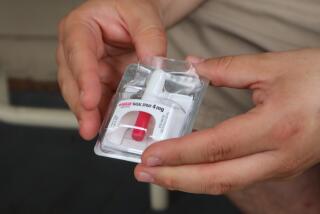Bill to Ease Area Code Shortage Sent to Gov. Davis
- Share via
California lawmakers on Wednesday passed a bill that could help reduce the public’s area code frustrations by assigning new codes to mobile phones, pagers, data lines and other non-voice services that use phone numbers.
The bill, sponsored by state Sen. Debra Bowen (D-Marina del Rey), was passed by the Assembly on Tuesday and won final approval in the Senate late Wednesday. Gov. Gray Davis has until Sept. 30 to sign or veto the bill. If he takes no action by that deadline, the bill will automatically become law.
The proposed law mandates the California Public Utilities Commission to seek federal permission to establish “technology-specific” overlay area codes in regions where an actual phone number shortage exists and where phone number conservation and other measures have been exhausted.
Bowen’s bill does not specify how the state would set up the new overlay area codes, but a technology-specific or service-specific area code plan could involve assigning a new area code to phone numbers used for mobile phones, pagers and such data-only services as automatic payment and debit systems at retail stores.
The bill also orders state regulators to seek federal permission to continue seven-digit dialing within the same area code for regions that adopt a technology-specific overlay.
Regulators from California, Connecticut, Ohio and several other states already have asked the Federal Communications Commission for approval for technology-specific codes.
The FCC, which has a standing order prohibiting that approach, has agreed to reconsider the matter, but has yet to issue a ruling.
Mobile phone carriers are vehemently opposed to technology-specific overlays, arguing that they will disrupt their large base of customers and amounts to an unfair hardship for the industry.
Regulatory Shake-Up: Loretta Lynch, president of the state Public Utilities Commission since March, has begun to make her presence felt in the agency.
Lynch has removed William Schulte from his position as consumer services director, a job he has held for 11 of his 28 years at the PUC. Schulte’s removal as director was effective earlier this month, but he has the option of staying at the PUC as a program manager in the rail safety area.
Schulte confirmed the change, but declined additional comment. Schulte’s deputy in charge of many of the unit’s enforcement cases, Larry McNeely, was on disability leave and recently retired from the PUC.
Sources say Kevin Coughlan has been named interim chief of enforcement in the consumer services division, but it’s unclear what other changes may be made in that unit. By way of explanation, Lynch has said she believes the commission has not been aggressive enough in protecting consumers.
Several weeks ago, Lynch also replaced Kent Kauss, the PUC’s director of the Office of Government Affairs and the commission’s primary representative before the state Legislature and other governmental bodies. Lynch named Sue Pedersen as his replacement.
MediaOne No More: Last week, new owner AT&T; launched a wide-ranging campaign that will replace the various MediaOne cable, Internet and phone services with services bearing the AT&T; logo. Beginning immediately, MediaOne customers (including more than 900,000 in California) will begin seeing new AT&T; logos on their monthly bills.
MediaOne NexTV is now AT&T; Cable; MediaOne Digital NexTV is now AT&T; Digital Cable; MediaOne Digital Telephone services is now AT&T; Digital Phone; and the high-speed Internet service that was MediaOne Road Runner is now AT&T; Road Runner.
*
Times staff writer Elizabeth Douglass can be reached at [email protected]. Recent 411 columns are available at http://vinapk.com/411.
More to Read
Get the L.A. Times Politics newsletter
Deeply reported insights into legislation, politics and policy from Sacramento, Washington and beyond. In your inbox three times per week.
You may occasionally receive promotional content from the Los Angeles Times.










